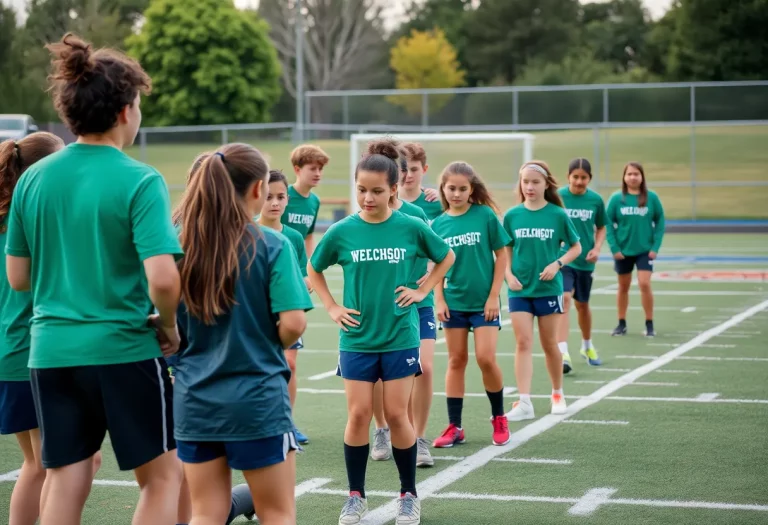News Summary
High school coaches in Tennessee face significant challenges including insufficient support and lack of guidance despite their qualifications. New coaches like Coach Smith experience an uphill battle with rigorous requirements and minimal direction. The need for structured support and mentorship is critical for enhancing the high school sports experience for both coaches and student-athletes.
Challenges Facing High School Coaches in Tennessee
In the charming city of Nashville, Tennessee, high school sports have long been a cherished part of adolescent life. From bond-building experiences to valuable life lessons, the benefits of playing sports during these formative years are plentiful. But, as new coaches step into the arena, they often find themselves tangled in a web of uncertainty and insufficient support.
The Case of Coach Smith
Take, for instance, Coach Smith, who recently landed a role as the head coach of a shiny new lacrosse team. With two decades of experience and a doctorate in sport and exercise science, she seemed more than capable of diving into coaching. However, a quick glance at her onboarding process revealed that despite her impressive credentials, she was met with an uphill battle of expectations and insufficient guidance.
From the moment she signed her contract and secured a modest stipend of $1,200, Coach Smith found herself in a race against time. She had a mere four days to complete essential requirements, which included a background check, CPR and concussion training, and an online Fundamentals of Coaching course. The kicker? She shelled out $300 just to meet these obligations.
Important Goals, but Little Direction
The Tennessee Secondary School Athletic Association asserts that the mission of high school athletics is to nurture athletes into commendable individuals and enhance their educational journey. Unfortunately, Coach Smith found herself without any concrete guidance on how to fulfill this mission. She felt lost, grappling with how to measure her effectiveness as a coach beyond her team’s win-loss record.
This gut-wrenching situation isn’t unique to Coach Smith. Many coaches in the area share a common sentiment of feeling unsupported in their quest to realize the ideals of high school sports. A concerning insight from research highlights that while joining high school sports can lessen dropout rates, foster improved emotional health, and boost community engagement, coaches still struggle with support systems.
The Positive Impact of Sports
We must acknowledge that participation in high school sports does come with its challenges, such as stress and unhealthy behaviors. But, studies, including a significant 2019 review, illustrate that the positives outweigh the negatives. When student-athletes engage in sports, they often develop essential life skills like teamwork and perseverance, alongside a sense of belonging.
A Look at National Oversight
Overseeing this vast landscape of student-athletes, the National Federation of State High School Associations (NFHS) champions health, safety, and leadership within sports. An analysis found that many state associations focus on supervising competitions and providing professional development for coaches. They emphasize not just winning but also instilling sportsmanship and leadership skills.
However, a significant disconnect has emerged. While most coaches desire formal leadership training, only a small fraction had the opportunity to engage in such programs. This highlights a notable gap in training standards that varies wildly from state to state.
Missing the Mark on Core Values
Interestingly, educational programs for coaches often do not evaluate their effectiveness, leaving many wondering if they truly are meeting the promises of high school sports. Furthermore, the joyful aspect of participating in sports—one of the main reasons students get involved—often seems lost amid the rush for competition.
The Need for Improvement
Coaches across the country would benefit immensely from receiving more structured support and feedback, helping them mentor student-athletes effectively in their quest for personal development. The findings suggest that a collaboration between high school athletic associations and researchers could greatly enhance coaching effectiveness, ultimately benefiting young athletes and their communities.
As challenges linger on the court and field, it’s clear that both coaches and student-athletes deserve better resources and support to transform the high school sports experience into something truly enriching and fulfilling.
Deeper Dive: News & Info About This Topic
LIVE BALL Resources
Bishop Montgomery High School Suspends Football Program
Dana Hills High School Cross Country Team Begins New Season
NCAA Oversight Committee Proposes New Single Transfer Portal Window for January 2026
Lincoln Southwest Softball Team Maintains Undefeated Streak at 8-0
High School Softball Rankings in Nebraska
Nebraska High School Softball Coaches Poll Rankings Released
Pahrump Valley High School Tennis Team Faces Bishop Gorman
Alton High School Tennis Team Achieves Dominant Win Over Collinsville
Jackson Tennis Teams Excel in Recent Matches
Jacksonville Honors Coach James Day with Hall of Fame Induction
Additional Resources
- Insight News: Are High School Sports Living Up to Their Ideals?
- Wikipedia: High School Sports
- Star Gazette: Elmira Notre Dame Football Coach Q&A
- Google Search: Tennessee High School Coaches
- Indy Star: Indiana High School Volleyball Coach
- Google Scholar: Coaching Effectiveness in High School Sports
- Cape Cod Times: Meet 22 New Coaches
- Encyclopedia Britannica: High School Athletic Associations
- Des Moines Register: Iowa High School Football Coaches
- Google News: High School Sports Coaching Challenges


